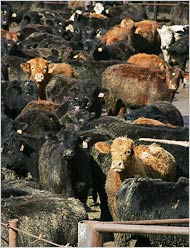Another Earth Day passes on, little attention, no change. Most people hold the thought process that one person cannot make a difference. Why not make the change, spread the word, and invoke change in others? At any rate this post is going to expose some truths of the livestock industry and its impact on Earth.
In his 1975 bestseller, The Eco-Spasm Report, futurist Alvin Toffler, author of Future Shock and The Third Wave, suggested a positive hope for the world’s crisis. He anticipated “the sudden rise of a religious movement in the West that restricts the eating of beef and thereby saves billions of tons of grain and provides a nourishing diet for the world as a whole.” This has not come to fruition, if anything, the opposite holds true.
Statistics show that Nigeria’s per-capita meat consumption is approximately 6.4 kilograms a year, China’s is about 23 kg, but, Canadains consume an average of 65 kg a year and the citizens of the US eat 95 kg. This shows the meatcentricity of Western society.
People do not view meat consumption in the same light as other commodities. Most associate over-consumption with gas, electricity, and water. A quick analysis of meat, where it comes from, and what goes into producing it provides insight into the true cost of producing meat.
Like all the products we buy, meat is made up of inputs. The largest are water, grain, land, and energy. Others include hormones to promote growth, antibiotics to prevent disease, and fertilizers and pesticides to grow the feed
To produce a kilogram of grain-fed beef, it takes, on average, 10 kg of grain and 680 liters of water (only what the animal consumes). In comparison, according to a study in California, 1 kg of tomatoes requires 190 liters of water, 1 kg of potatoes requires 198 liters of water, 1 kg of wheat requires 209 liters of water – but 1 kg of beef requires a whopping 43,500 liters of water (this takes into account the water needed to grow the feed along with the water needed to raise the animal). Even rice, which uses more water than any other grain, requires one tenth the water needed to produce meat.
In order to meet our demand for meat, millions of tons of grain are diverted to feed livestock. More than 1/3 of the world’s total grain harvest is fed to livestock. Another requirement to raise livestock is land. An equivalent amount of land can feed six times more people eating a plant-based diet than people eating a meat-based diet.
Besides consuming an immense amount of resources, livestock also creates large amounts of garbage. Production of 1 kg of edible beef leads to 40 kg of manure. The manure and urine waste, plus the pesticides and fertilizers used to grow feed, are among the largest sources of water pollution in North America. With the population steadily increasing and the average person consuming more meat, the consequences could be disastrous.
Having said all this, I by no means am promoting vegetarianism. I feel the awareness of these facts can lead to people eating healthier by substituting some meat meals with vegetarian meals. Everything in moderation. In addition I feel that grain diverted to human consumption could solve some of the world’s hunger issues. We can all make a difference, every little bit will help. Let’s make some changes if not for the environment, at least for ourselves.
4/21/08 – 5.5 miles in 49:02 (8:54 per mile pace)


In your last statement, you said, “if not for the environment, at least for ourselves.” I believe that by doing things for ourselves, we are doing something for the environment.
I don’t know if you saw it or not, but I did another blog post at my other site about the Carbon Footprint of a Cheeseburger, http://www.iowaavenue.com/profiles/blog/show?id=774881%3ABlogPost%3A25464.
I hope you check it out…………………:)
BTW, thanks for commenting on my site.
I didn’t directly view helping the environment as helping ourselves but you are absolutely right.
very informative! and thanks for the comment on my page!
Not that I’m totally impressed, but this is more than I expected for when I stumpled upon a link on Furl telling that the info is awesome. Thanks.
Wonderful info. Hope to definitely come back soon…
Hello, every time i used to check website posts here
early iin the morning, as i love to learn more and more.